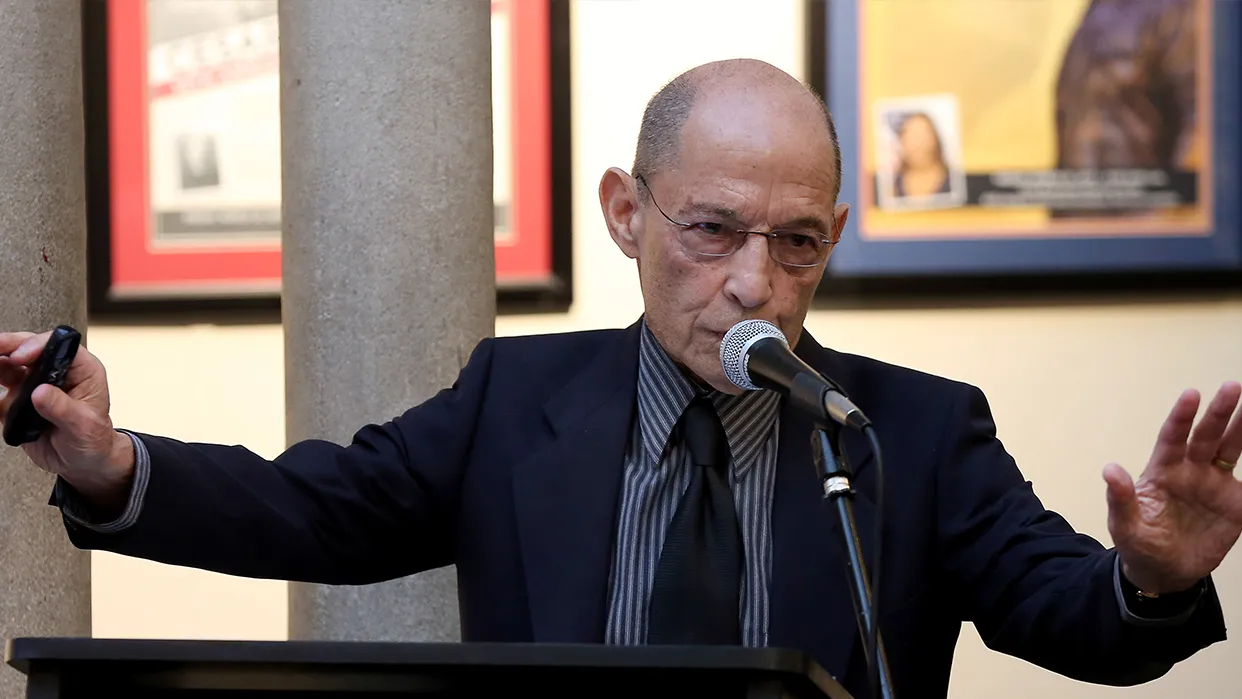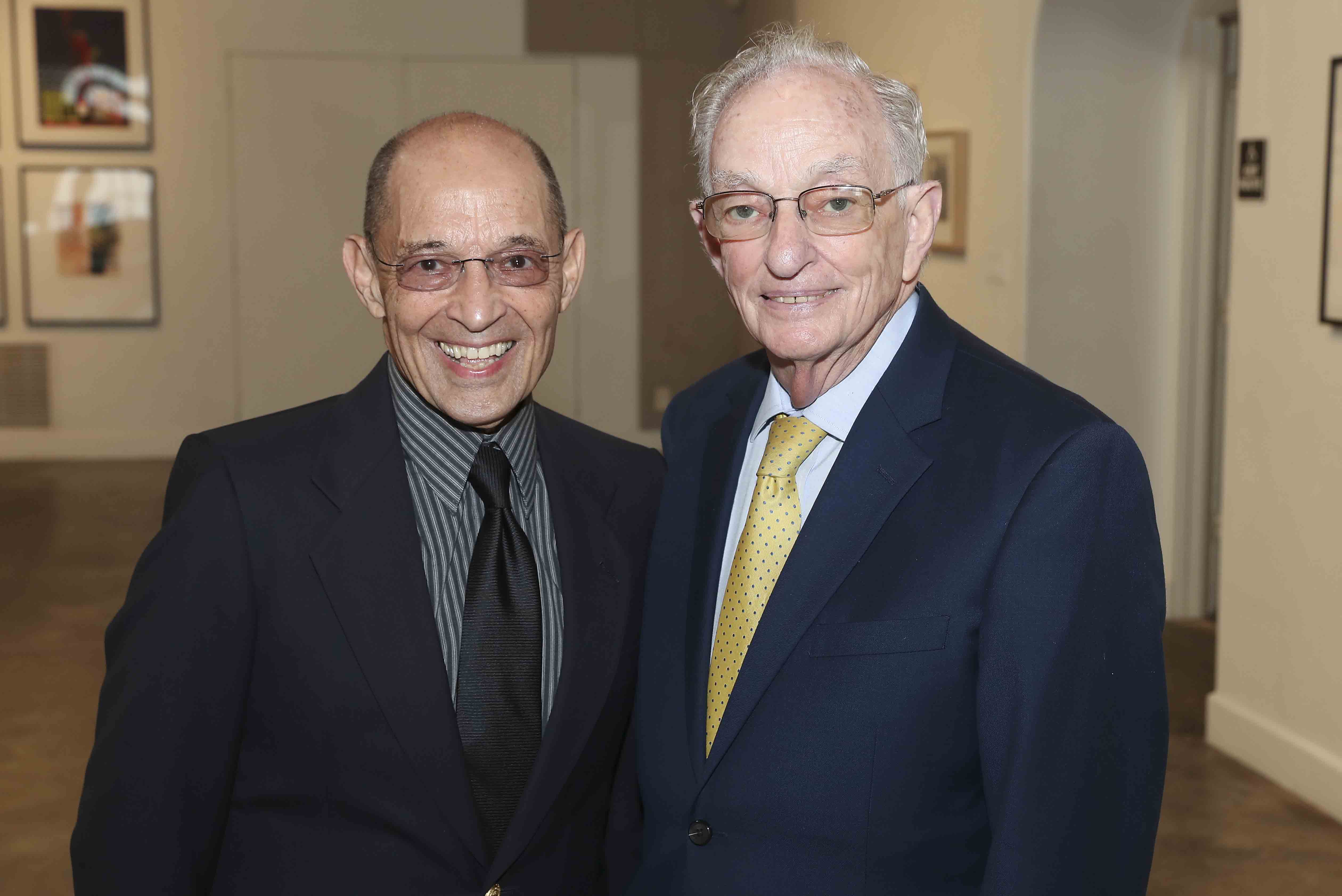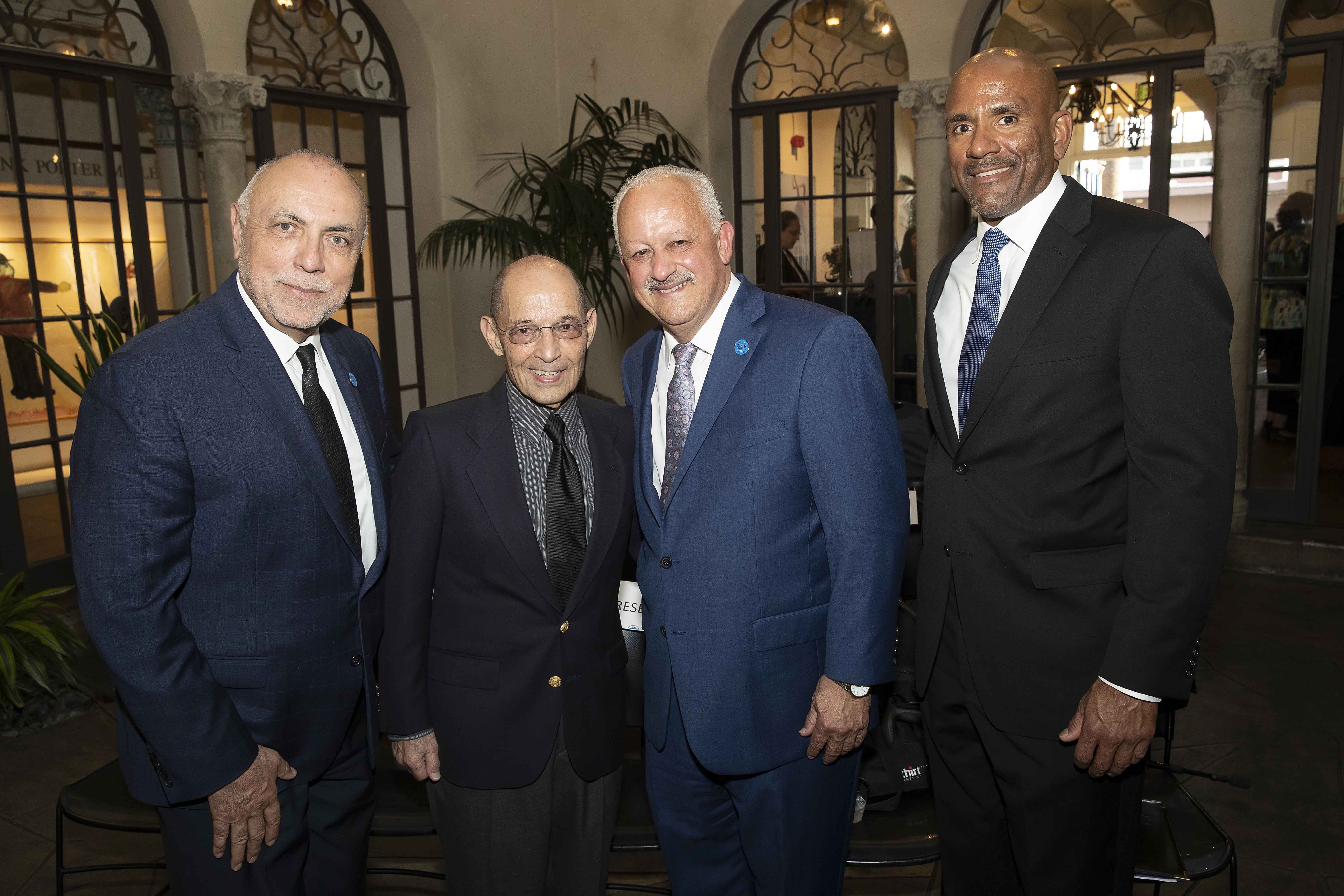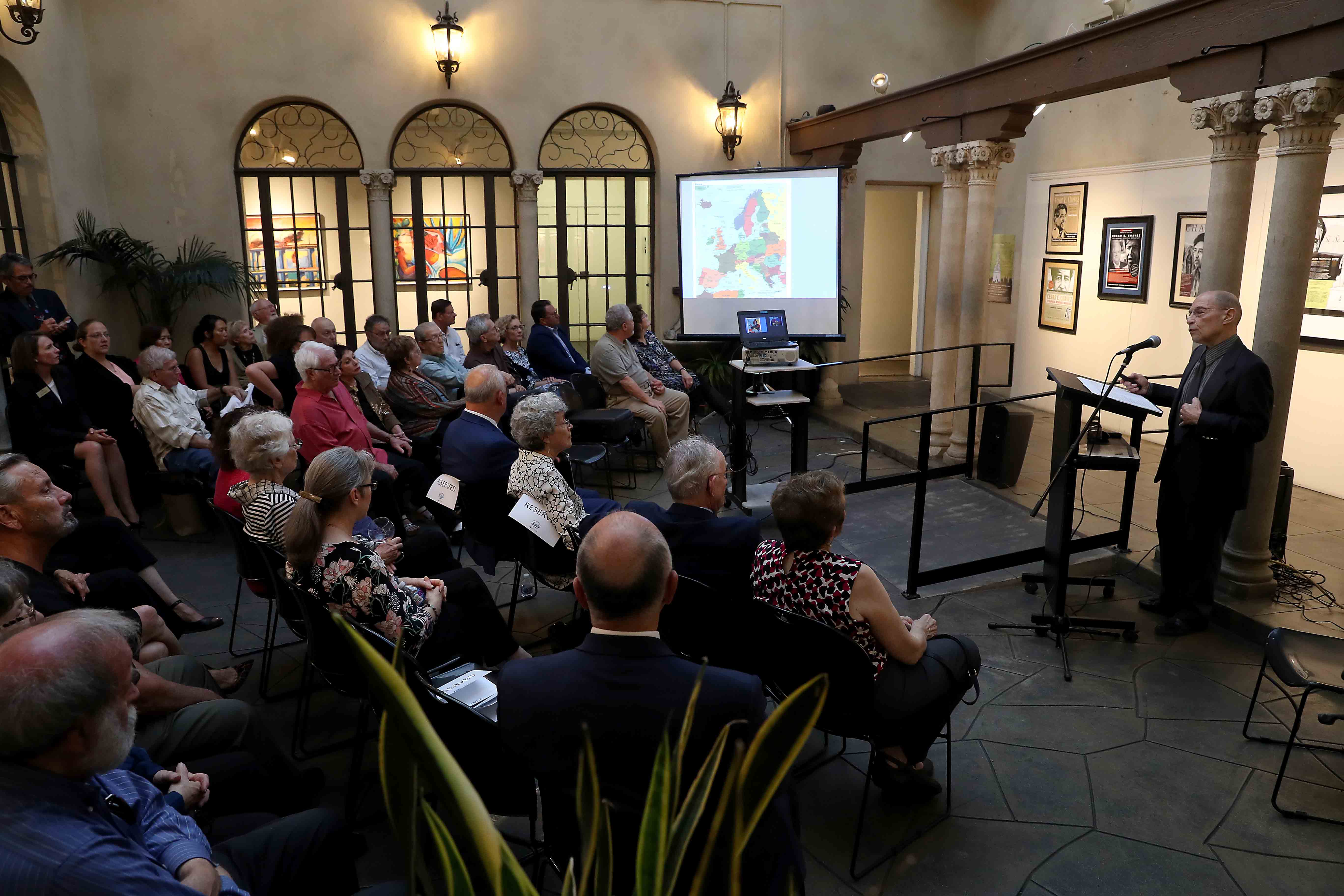Joe Gutierrez Office of Strategic Communication (909) 537-5007 joeg@csusb.edu

Photos by Robert A. Whitehead/CSUSBGerald Sorin, the Distinguished Professor of American and Jewish Studies and the director of the Louis and Mildred Resnick Institute for the Study of Modern Jewish Life at the State University of New York, New Paltz, was the featured speaker at the Third Annual Rabbi Hillel Cohn Endowed Lecture on the Contemporary Jewish Experience. His talk, “Remnants of Jewish Life in Post-Holocaust Europe: A Personal Journey,” was given twice, Monday, May 13, at Cal State San Bernardino’s Palm Desert Campus in Palm Desert, and Tuesday, May 14, at the Riverside Art Musuem in Riverside. CSUSB President Tomás D. Morales called the evening special as he introduced Sorin, praising him for his work with students. “Whenever I speak with faculty and staff, I share with them how meaningful it is to touch our students. When they invite our students to their office for office hours, engage our students in discussions or conversations about their careers, they validate our students,” Morales said. “The interaction of our faculty with our students is just so meaningful for our students. I will share with you on a very personal level that Gerry Sorin, for me, was that faculty member,” Morales said. “In 1971, when I was a freshman at the State University of New York at New Paltz, I went to see this faculty member because I was interested in history and he just made me feel so welcome, so caring.” Morales said the two talked about history. Then Sorin and his wife invited to their home for dinner the young Morales and his wife. “That sent a message to me that made me feel validated, that made me feel I belonged at SUNY New Paltz,” Morales said. “I became a history major. I just want to thank you, Gerry, from the bottom of my heart.” Sorin shared his experiences in Europe in 1990 when he was teaching in Amsterdam outside the classroom. He visited towns and villages that had been home to Jews for centuries. He visited centuries old synagogues and Jewish graveyards. Many of these locations had been thriving, but that all changed when the Nazis came to power prior to World War II and their focus was to remove Jews from Germany and ultimately Europe. However, Sorin said that it was not just the Nazis. As an example, in 1938, there was a conference that brought together 32 countries to discuss what to do with Jewish refugees. Adolf Hitler, Germany’s chancellor, said he would be happy to send the Jews to these countries. But in the end, only one nation, the Dominican Republic, agreed to take its share of refugees. “For the Jews in the 1930s, it was not how to get out, but where to go,” Sorin said. Sorin said it is also reflected in the current refugee crisis in Europe along with the rise of white supremacy, nationalism and rightwing parties. “We are seeing history repeat itself that certain conditions, certain current events have deeply troubling similarities to past events,” Sorin said. He included the rise of anti-Semitism in the United States and the fatal shooting attacks on synagogues, such as the shooting at a synagogue in Pittsburgh where 11 people were killed and seven injured.In his travels during 1990, Sorin shared his experiences visiting concentration camps in the Netherlands and Germany, such as Dachau, where he and others prayed for those who perished in the death camps. He said the Jewish population has been increasing in parts of Europe, including Germany, but nowhere near the numbers of prewar Europe. However, in other parts, the Jewish population is declining.He said governments are dealing with anti-Semitism. He said Czech lawmakers said anti-Semitism is a prevailing problem and must be tackled. But the problem of ultra-nationalism continues to grow. As an example, Sorin showed an image of a protest in Slovakia. Ultra right-wingers marched to a sign that read “No refugees, no immigrants, no dictates from the European Union.” Sorin, who holds degrees from Columbia College, Wayne State University and Columbia University, has taught history at the State University of New York, New Paltz since 1965. He has also taught in the Netherlands at the University of Utrecht’s School of Journalism, and at the University of Nijmegen, where he held the John Adams Distinguished Chair in American Studies as a Fulbright Professor. In addition to teaching, Sorin is a published author whose books include “The Prophetic Minority: American Jewish Immigrant Radicals, 1880–1920;” “The Nurturing Neighborhood: The Brownsville Boys Club and Jewish Community in Urban America, 1940–1990;” “A Time for Building: The Third Migration, 1880–1920;” “Tradition Transformed: The Jewish Experience in America and Irving Howe: A Life of Passionate Dissent,” winner of the National Jewish Book Award in 2002. Sorin has also published numerous essays and reviews on aspects of ethnic identity and acculturation. He is the former chairman of the history department (1986-1996) at SUNY, New Paltz, and continues there, since 1983, as director of the Jewish Studies Program. In 1989, he founded and continues to direct the Louis and Mildred Resnick Institute for the Study of Modern Jewish Life. And in 1994 he was awarded the State University of New York’s highest rank – Distinguished University Professor. The Rabbi Hillel Cohn Endowed Lecture on the Contemporary Jewish Experience was established at California State University, San Bernardino in 2017 in recognition of Rabbi Cohn’s many achievements as a religious and community leader. This is the first time in the history of the entire California State University system that a rabbi has been so honored. Cohn has been active in many community organizations in the San Bernardino area, including the Institutional Review Board at Arrowhead Regional Medical Center and the Diocesan Health Care Committee of the Roman Catholic Diocese of San Bernardino. He was the founding chairperson of the City of San Bernardino Human Relations Commission, and currently serves as a member of that commission. Cohn also has produced and hosted “The Many Faces of San Bernardino: Dialogues on Diversity,” a regular half-hour program on KCSB (Channel 3). He was one of the founders of Inland Congregations United for Change and currently serves as a board member of The Community Foundation of Riverside and San Bernardino, Planned Parenthood of Orange and San Bernardino Counties, The Unforgettables Foundation and The Brightest Star. In 2014, Cohn was one of six inductees selected for the CSUSB College of Social and Behavioral College’s Hall of Fame. A native of Germany, Cohn was brought to the United States as an infant by his parents who were refugees from Nazism. Cohn grew up in the Pacific Northwest and Southern California and received a B.A. in political science from UCLA in 1959. He received rabbinical training at Hebrew Union College in Los Angeles and Cincinnati, where he was ordained as a rabbi in 1963 and received a master’s degree. He earned a doctor of ministry degree from the Claremont School of Theology in 1984, specializing in ethics and communication. In 1988 he was awarded an honorary doctor of divinity degree by the Hebrew Union College. For more information on the Rabbi Hillel Cohn Endowed Lecture on the Contemporary Jewish Experience, contact the CSUSB Office of Strategic Communication at (909) 537-5007 and visit inside.csusb.edu.

Gerald Sorin and Rabbi Hillel Cohn

From left: Robert Nava, CSUSB vice president, University Advancement; speaker Gerald Sorin: Tomás D. Morales, CSUSB president; and Rafik Mohamed, dean, College of Social & Behavioral Sciences . Photo by Robert A. Whitehead/CSUSB
